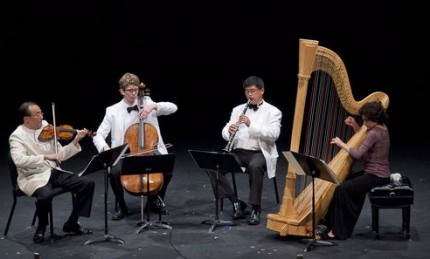La Jolla Quartet offers a pleasing program at Mandel Hall

Exceptional playing at the service of some unusual chamber pieces highlighted Friday evening’s University of Chicago Presents concert at Mandel Hall. The La Jolla Quartet, named for the annual summer festival in Southern California, consists of violinist Cho-Liang Lin, CSO clarinetist John Bruce Yeh, harpist Deborah Hoffman, and cellist Joshua Roman. In varying configurations they presented a program of pleasing and fitfully substantial works culminating in John Williams’ 2011 Quartet La Jolla, written for and dedicated to Lin and Yeh.
The program opened with a charming bit of English pastoralism: a Suite for clarinet and harp from British composer Paul Reade’s incidental music for the 1980s BBC-TV show The Victorian Kitchen Garden. Using the harp in place of piano as accompaniment brought out the gem-like nature of these slight pieces, which were played by Yeh with a clean, effortless tone that bewitched the ear.
A more ambitious work followed, the Concerto a Tre (1946) for clarinet, violin and cello by the California-based German/American composer Ingolf Dahl (1912–1970). Betraying influences from the neoclassical Stavinsky, this piece alternates between long reflective sections and jaunty, humorous stretches, and was played impeccably by Yeh, Lin, and the young American cellist Joshua Roman. Dahl wrote relatively little music, but his works deserve to be heard and enjoyed much more than often they are.
Another composer who is often underestimated is the eclectic and prolific Jacques Ibert, whose Trio for violin, cello and harp (1946) displays the characteristic French elements of clarity and grace, made all the more pointed by the artistry of Hoffman. The three short movements offer plenty of opportunity for solos and ensembles with the cello and harp contributing tender and romantic elements to the dynamic violin part, the whole work culminating in a brusque and virtuosic finale.
The early twentieth-century Norwegian composer Johann Halvorsen’s Passacaglia for violin and cello, an energetic transcription of harpsichord music by Handel, used to be a staple of Heifetz’s repertory. The duo’s virtuosic double-stops, pizzicatos and ornate dynamism make it a real showpiece, fully realized here by the sterling technique of the gifted Lin and the solid cello-playing of Roman.
The high point of the evening’s program was the unexpectedly masterful Fantasie for violin and harp, Op. 124, written in 1907 by the 72 year- old Camille Saint-Saens. Lin played this episodic piece with a singing tone and perfect intonation, seconded by the exquisite artistry of harpist Hoffman. This is salon music of the highest quality displaying delicacy and romantic feeling throughout.
The Quartet La Jolla by composer-conductor John Williams was something of an anticlimax coming as it did after so much refined glamour. While it was a respectable and even impressive work in spots, ultimately the quartet is lacking in thematic interest, surprising coming from one of our day’s most prolific and resourceful film composers. The music was abstractly rhythmic, at times brusque in the first movement Introduction; smoothly harmonic in the Aubade with nice opportunities for the harp; and bubbly and dynamic in the Scherzo.
The clarinet soared over the cello’s pizzicatos in the fourth movement Cantando and the forward impulse of the Finale, sounding like Prokofiev at times, had a good humored feel and some generous solo work for violin and cello. Overall it was fairly conventional music—interesting perhaps for its textures and rhythms, but rather bare in content. That said, it was beautifully played as was everything else in Friday evening’s performance.
Posted in Performances






Posted Nov 19, 2012 at 12:53 pm by Walt
Beautiful performance indeed. The violin wasn’t drown out as I’ve seen in other quartets. I agree that the selections themselves did not strike me as particularly varied or innovative. I would love to rewrite Passacaglia as violin duet music.